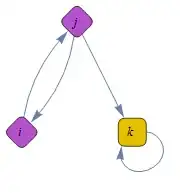When there are finite states, a state is recurrent iff it is essential. This is Remark 1.24 in http://pages.uoregon.edu/dlevin/MARKOV/markovmixing.pdf
but there is no proof provided.
The following is my proof.
(=>) it is easy to show that a recurrent state is essential
(<=) We show this direction by contradiction. Suppose in a finite chain, there exists an essential state i that is not recurrent. Then,
$$ Pr(X_n \not = i, \ \forall n \geq 1| X_0 =i)>0$$
Thus, there exists a sequence $\{ X_0=j_0=i, X_1=j_1, \dots, X_n =j_n, \dots \}$ such that
$$ j_n \not = i, \, \forall\, n \geq 1$$
and
$$ Pr(X_n = j_n, \ \forall n \geq 1| X_0=j_0) = \Pi_{n=1}^{+\infty} p_{j_{n-1}j_n}>0$$
Taking negative log on both sides gives us
$$ \sum_{n=1}^{+\infty} -\log(p_{j_{n-1}j_n})< + \infty$$
Thus, $p_{j_{n-1}j_n}\to 1$.
However, when there are finite states, there are finite values of transition probabilities, so there exists $N$, such that for any $n \geq N$, $p_{j_{n-1}j_n}= 1$. As a result, $j_N$ is accessible from state $i$, but state $i$ is not accessible from $j_N$. This violates the condition that $i$ is essential. The proof is done.
